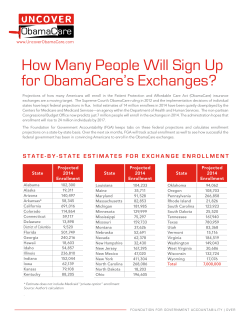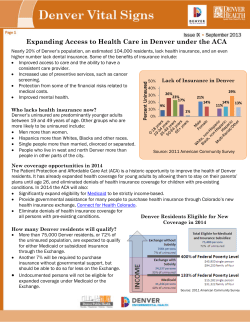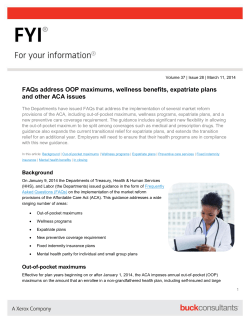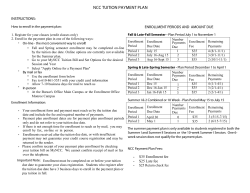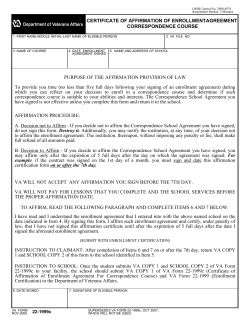
2014 Open Enrollment Checklist Brought to you by Cross Employee Benefits
Brought to you by Cross Employee Benefits 2014 Open Enrollment Checklist To prepare for open enrollment, health plan sponsors should become familiar with the legal changes affecting their plans for the 2014 plan year. These changes are primarily due to the Affordable Care Act (ACA). Many of the ACA’s key reforms will become effective in 2014. Plan sponsors should review their plan documents to confirm that they include these required changes. In addition, any changes to a health plan’s benefits for the 2014 plan year should be communicated to plan participants. Health plan sponsors should also confirm that their open enrollment materials contain certain required participant notices, such as the summary of benefits and coverage under the ACA. There are also some participant notices that must be provided annually or upon initial enrollment. To minimize cost and streamline administration, employers should consider also including these notices in their open enrollment materials. HEALTH PLAN CHANGES □ Grandfathered Plan Status A grandfathered plan is one that was in existence when health care reform was enacted on March 23, 2010. If you make certain changes to your plan that go beyond permitted guidelines, your plan is no longer grandfathered. Contact your Cross Employee Benefits representative if you have questions about changes you have made, or are considering making, to your plan. □ o If you have a grandfathered plan, determine whether it will maintain its grandfathered status for the 2014 plan year. Grandfathered plans are exempt from some of the ACA’s requirements. A grandfathered plan’s status will affect its compliance obligations from year-to-year. o If you move to a non-grandfathered plan, confirm that the plan has all of the additional patient rights and benefits required by the ACA. This includes, for example, coverage of preventive care without cost-sharing requirements. Annual Limits on Essential Health Benefits Effective for plan years beginning on or after Jan. 1, 2014, health plans are prohibited from placing annual limits on essential health benefits. The ACA’s prohibition on annual limits was phased in over a three-year period; restricted annual limits were permitted for plan years beginning before Jan. 1, 2014. Some plans received annual limit waivers from HHS during the phase-in period. These waivers all expire effective for the 2014 plan year. □ Pre-existing Condition Exclusions Effective for plan years beginning on or after Jan. 1, 2014, the ACA prohibits health plans from imposing preexisting condition exclusions (PCEs) on any enrollees. PCEs for enrollees under 19 years of age were eliminated by the ACA for plan years beginning on or after Sept. 23, 2010. 1 2014 Open Enrollment Checklist □ Dependent Coverage to Age 26 Effective for plan years beginning on or after Sept. 23, 2010, the ACA requires health plans that provide dependent coverage of children to make coverage available for adult children up to age 26. However, for plan years beginning before Jan. 1, 2014, grandfathered plans were not required to cover adult children under age 26 if they were eligible for other employer-sponsored group health coverage. If your plan is grandfathered, confirm that it will make coverage available to adult children up to age 26 regardless of whether they are eligible for other employer-sponsored group health coverage, effective for the 2014 plan year. □ Excessive Waiting Periods Effective for plan years beginning on or after Jan. 1, 2014, a health plan may not impose a waiting period that exceeds 90 days. A waiting period is the period of time that must pass before coverage for an employee or dependent who is otherwise eligible to enroll in the plan becomes effective. Other conditions for eligibility are permissible, as long as they are not designed to avoid compliance with the ACA’s 90-day waiting period limit. □ Coverage for Clinical Trial Participants Effective for plan years beginning on or after Jan. 1, 2014, non-grandfathered health plans cannot terminate coverage because an individual chooses to participate in a clinical trial for cancer or other life-threatening diseases or deny coverage for routine care that would otherwise be provided just because an individual is enrolled in a clinical trial. □ Limits on Cost-sharing Effective for plan years beginning on or after Jan. 1, 2014, non-grandfathered health plans are subject to limits on cost-sharing or out-of-pocket costs. Out-of-pocket expenses may not exceed the amount applicable to coverage related to HSAs (for 2014, $6,350 for self-only coverage and $12,700 for family coverage). Deductibles may not exceed $2,000 (single coverage) or $4,000 (family coverage). These amounts are indexed for subsequent years. Final guidance on this requirement provides that the deductible requirement will apply only to nongrandfathered plans in the insured small group market, while the out-of-pocket cost limit will apply to all nongrandfathered health plans (including self-insured plans and plans and issuers in the large group market). The final guidance also provides that a health plan’s annual deductible may exceed the ACA limit if a plan could not reasonably reach the actuarial value of a given level of coverage (that is, a metal tier - bronze, silver, gold or platinum) without exceeding the limit. In addition, special transition relief for the out-of-pocket maximum has been provided for plans that use more than one service provider to administer benefits. Under this transition relief, only for the first plan year beginning on or after Jan. 1, 2014, where a group health plan or group health insurance issuer utilizes more than one service provider to administer benefits that are subject to the ACA’s out-of-pocket maximum, the annual limit will be satisfied if both of the following conditions are met: o The plan complies with the out-of-pocket maximum with respect to its major medical coverage (excluding, for example, prescription drug coverage and pediatric dental coverage); and o To the extent there is an out-of-pocket maximum on coverage that does not consist solely of major medical coverage (for example, if a separate out-of-pocket maximum applies with This Legislative Brief is not intended to be exhaustive nor should any discussion or opinions be construed as legal advice. Readers should contact legal counsel for legal advice. © 2013 Zywave, Inc. All rights reserved. EM 10/13 2 2014 Open Enrollment Checklist respect to prescription drug coverage), this maximum does not exceed the ACA’s out-ofpocket maximum. □ Comprehensive Benefits Package Starting in 2014, insured plans in the individual and small group market must cover each of the essential benefits categories listed under the ACA. This requirement does not apply to grandfathered plans, self-funded plans or insured plans in the large group market. □ HSA Limits for 2014 If you offer a high deductible health plan (HDHP) to your employees that is compatible with a health savings account (HSA), you should confirm that the HDHP’s minimum deductible and out-of-pocket maximum comply with the 2014 limits. Also, the 2014 increased HSA contribution limits should be communicated to participants. The following table contains the HDHP and HSA contribution limits for 2014. HDHP Minimum Deductible Amount Individual Family $1,250 $2,500 HDHP Maximum Out-of-Pocket Amount Individual Family $6,350 $12,700 HSA Maximum Contribution Amount Individual Family $3,300 $6,550 Catch-up Contributions (age 55 or older) $1,000 ACA DISCLOSURE REQUIREMENTS □ Summary of Benefits and Coverage The ACA requires health plans and health insurance issuers to provide a summary of benefits and coverage (SBC) to applicants and enrollees to help them understand their coverage and make coverage decisions. Plans and issuers must provide the SBC to participants and beneficiaries who enroll or re-enroll during an open enrollment period. The SBC also must be provided to participants and beneficiaries who enroll other than through an open enrollment period (including individuals who are newly eligible for coverage and special enrollees). Federal agencies have issued a revised template for SBCs provided with respect to coverage for 2014 plan years. The updated template includes information on whether the plan provides minimum essential coverage and meets minimum value requirements. The updated SBC template (and sample completed SBC) are available on the Department of Labor (DOL) website. In connection with your plan’s 2014 open enrollment period, the SBC should be included with the plan’s application materials. If plan coverage automatically renews for current participants, the SBC must generally be provided no later than 30 days before the beginning of the new plan year. This Legislative Brief is not intended to be exhaustive nor should any discussion or opinions be construed as legal advice. Readers should contact legal counsel for legal advice. © 2013 Zywave, Inc. All rights reserved. EM 10/13 3 2014 Open Enrollment Checklist For self-funded plans, the plan administrator is responsible for providing the SBC. For insured plans, both the plan and the issuer are obligated to provide the SBC, although this obligation is satisfied for both parties if either one provides the SBC. Thus, if you have an insured plan, you should work with your health insurance issuer to determine which entity will assume responsibility for providing the SBCs. Please contact your Cross Employee Benefits representative for assistance. □ Grandfathered Plan Notice If you have a grandfathered plan, make sure to include information about the plan’s grandfathered status in plan materials describing the coverage under the plan, such as summary plan descriptions (SPDs) and open enrollment materials. Model language is available from the DOL at www.dol.gov/ebsa/grandfatherregmodelnotice.doc. □ Notice of Patient Protections Under the ACA, non-grandfathered group health plans and issuers that require designation of a participating primary care provider must permit each participant, beneficiary and enrollee to designate any available participating primary care provider (including a pediatrician for children). Also, plans and issuers that provide obstetrical/gynecological care and require a designation of a participating primary care provider may not require preauthorization or referral for obstetrical/gynecological care. If a non-grandfathered plan requires participants to designate a participating primary care provider, the plan or issuer must provide a notice of these patient protections whenever the SPD or similar description of benefits is provided to a participant, such as open enrollment materials. If your plan is subject to this notice requirement, you should confirm that it is included in the plan’s open enrollment materials. The DOL‘s model language for this notice is available at www.dol.gov/ebsa/patientprotectionmodelnotice.doc. OTHER NOTICES Group health plan sponsors should consider including the following enrollment and annual notices with the plan’s open enrollment materials. □ Initial COBRA Notice Plan administrators must provide an initial COBRA notice to participants and certain dependents within 90 days after plan coverage begins. The initial COBRA notice may be incorporated into the plan’s SPD. The DOL’s model initial COBRA Notice is available at www.dol.gov/ebsa/modelgeneralnotice.doc. □ HIPAA Privacy Notice If a group health plan is required to maintain a privacy notice, it must be distributed to new participants when they enroll for coverage. For fully insured plans, the issuer is generally responsible for providing the privacy notice to new enrollees. In addition, the final HIPAA rule from January 2013 requires health plans to update their HIPAA Privacy Notices and distribute them as follows: o A health plan that posts its privacy notice on its website must post the material changes or its revised notice on the website by Sept. 23, 2013, and provide the revised notice (or information about the material change and how to obtain the revised notice) in its next annual mailing to plan participants, such as during the plan’s open enrollment period. This Legislative Brief is not intended to be exhaustive nor should any discussion or opinions be construed as legal advice. Readers should contact legal counsel for legal advice. © 2013 Zywave, Inc. All rights reserved. EM 10/13 4 2014 Open Enrollment Checklist o □ A health plan that does not have a website must provide the revised notice (or information about the material change and how to obtain the revised notice) within 60 days of the material revision to the notice. Notice of HIPAA Special Enrollment Rights At or prior to the time of enrollment, a group health plan must provide each eligible employee with a notice of his or her special enrollment rights under HIPAA. □ Annual CHIPRA Notice Group health plans covering residents in a state that provides a premium subsidy to low-income children and their families to help pay for employer-sponsored coverage must send an annual notice about the available assistance to all employees residing in that state. The DOL has provided a model notice, which is available at www.dol.gov/ebsa/pdf/chipmodelnotice.pdf. □ WHCRA Notice Plans and issuers must provide notice of participants’ rights under the Women’s Health and Cancer Rights Act (WHCRA) at the time of enrollment and on an annual basis. Model language for this disclosure is available at www.dol.gov/ebsa/publications/CAG.html in the compliance assistance guide. □ Medicare Part D Notices Group health plan sponsors must provide a notice of creditable or non-creditable prescription drug coverage to Medicare Part D eligible individuals who are covered by, or who apply for, prescription drug coverage under the health plan. This creditable coverage notice alerts the individuals as to whether or not their prescription drug coverage is at least as good as the Medicare Part D coverage. The notice generally must be provided at various times, including when an individual enrolls in the plan and each year before Oct. 15 (when the Medicare annual open enrollment period begins). Model notices are available at www.cms.gov/creditablecoverage. □ Michelle’s Law Notice Group health plans that condition dependent eligibility on a child’s full-time student status must provide a notice of the requirements of Michelle’s Law in any materials describing a requirement for certifying student status for plan coverage. Under Michelle’s Law, a plan cannot terminate a child’s coverage for loss of full-time student status if the change in status is due to a medically necessary leave of absence. □ HIPAA Opt-out for Self-funded, Non-federal Governmental Plans Sponsors of self-funded, non-federal governmental plans may opt out of certain federal mandates, such as the mental health parity requirements and the WHCRA coverage requirements. Under an opt-out election, the plan must provide a notice to enrollees regarding the election. The notice must be provided annually and at the time of enrollment. Model language for this notice is available for sponsors to use. This Legislative Brief is not intended to be exhaustive nor should any discussion or opinions be construed as legal advice. Readers should contact legal counsel for legal advice. © 2013 Zywave, Inc. All rights reserved. EM 10/13 5
© Copyright 2025
